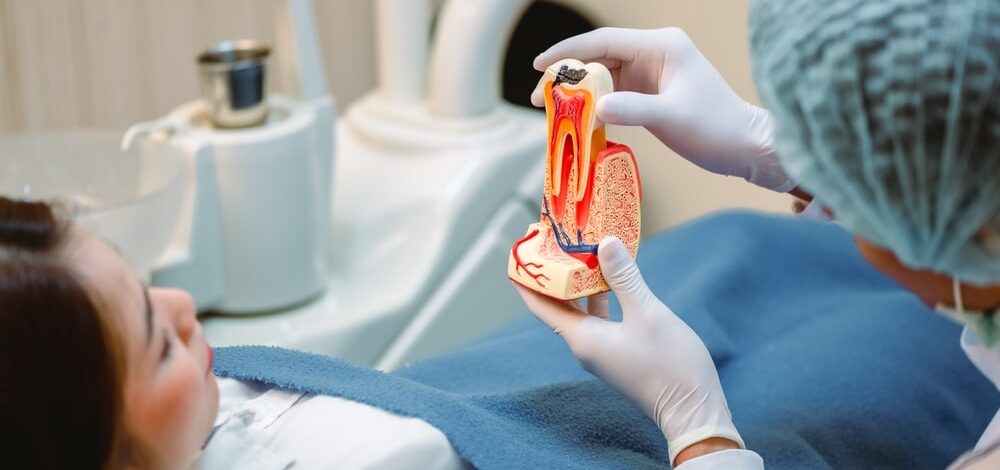
Neglecting to keep a good dental hygiene routine can lead to poor oral health. When you don’t take your oral health seriously, smaller problems like plaque and gingivitis can progress into bigger problems that are harder and more costly to treat, such as cavities, infection, tooth decay and loss, bone deterioration, and jaw atrophy. It is important to maintain regular dental care and cleanings
At Dental Depot of Kansas City, we believe taking your oral health seriously should be easy, convenient, and affordable, and we do everything we can to make it that way. From comprehensive dental services for the whole family all at one location to flexible scheduling and a plethora of payment options, Dental Depot of Kansas City is here to help you achieve the healthiest smile possible.
Good oral health encompasses a range of factors that contribute to the well-being of your teeth, gums, and mouth. What is your oral health like right now? A good place to start is by taking a look at the condition of your mouth.
Clean and Plaque-Free Teeth
Brushing your teeth at least twice a day with fluoride toothpaste helps prevent the buildup of plaque, a sticky film of bacteria that can lead to cavities and gum disease. If you brush and floss regularly, you’re keeping bacteria and plaque from accumulating on your teeth. You’re also stopping tartar and dental calculus, hardened substances that require professional removal.
Healthy Gums
Pink and firm gums are indicative of good oral health. Healthy gums do not bleed easily when brushing or flossing. If your gums bleed or are sore when you brush, you should visit a dentist, since these are signs of gingivitis. If you don’t take care of it, gingivitis will eventually progress into gum disease, but it is highly treatable and even reversible if caught early.
Fresh Breath
The regular brushing, flossing, and tongue cleaning that you do when you take your mouth health seriously helps to eliminate the bacteria responsible for halitosis, or bad breath. The fewer microorganisms that can colonize in your mouth, the fresher your breath (and the healthier your teeth).
No Tooth Sensitivity or Pain
Healthy teeth should not cause pain or sensitivity when exposed to hot, cold, or sweet foods. This indicates that the enamel is strong and thick, providing a protective barrier against bacteria and other particles that can irritate the nerves of the teeth, and that the gums have not receded from the tooth roots.
While a quick glance in the mirror can give you an idea of what’s going right in your mouth, the things that can start going wrong when you don’t take care of your oral health are much more subtle and virtually unnoticeable at first. Though it may not seem like a big deal, just a few days of neglecting your dental hygiene routine can begin to trigger a cascade of changes that can turn into big problems down the road.
Everyone has those days when you’re so exhausted that you forget to brush your teeth or simply decide not to; it happens. However, the longer you go without brushing and removing food particles and sugars from your teeth, the faster bacteria begin to grow in number. While you’re sleeping, your mouth produces less of the saliva that washes this bacteria away, and the drier environment, coupled with the residue that is still on your teeth, allows the bacteria to multiply by the millions, producing as waste the acids that begin to eat away at the enamel.
When they’re allowed to remain in your mouth, all of this bacteria is going through its life cycle of reproduction, waste creation, and death hundreds of millions of times each day. Over time, if you’re not brushing the bacteria away, it begins to form tartar—a hard buildup that serves as an impenetrable shield underneath which acids are still eating away at your teeth and irritating your gums. Tartar can’t be removed with your toothbrush; it requires a professional cleaning with specialized tools.
If it’s been a few months since you’ve maintained a consistent oral hygiene routine or visited the dentist for a cleaning, tartar is starting to accumulate on your teeth, and the acids have had plenty of time to work. Within about six months, you will start to develop cavities, which are holes or weakened areas in the enamel. If left untreated, bacteria will continue to penetrate these weak areas until they find their way deeper into the dental pulp or tooth roots.
By now, you likely have multiple cavities that are allowing bacteria into the sensitive interiors of your teeth. Between 12 and 18 months of poor oral hygiene, you’ll probably be feeling tooth sensitivity or pain in reaction to sugars, hot foods, or cold drinks. The bacteria have made their way to the dental pulp, the collection of the nerves and blood vessels deep within the tooth. As the bacteria begin to expel waste inside this sensitive area, you might develop a painful infection that can cause pain so severe it’s hard to sleep or carry out your daily activities. The best treatment for this condition is a root canal, which can relieve the pain immediately. In the worst cases, this infection can spread to nearby areas, including the brain.
You may have been able to tough out the discomfort so far, but after two years of poor oral care, conditions are worsening. The bacteria that have infiltrated your teeth’s softer tissues through cavities are now eating away at the nerves and blood supply, weakening the tooth. It may crack or chip as a result. At the same time, your gums may begin to pull away from your teeth due to inflammation, making your teeth loose in their sockets. This could cause pain and even change the shape of your smile as teeth drift further out of alignment.
By now, your teeth are having a difficult time without proper oral care. Some may have already fallen out or are nearly there, and others may be cracked or severely decayed and discolored. You may suffer from inescapable bad breath, even if you chew gum or try other solutions, because the bacteria have taken hold of substantial portions of your teeth.
At this point, you may notice a change in the shape of your face as your jawbone atrophies due to missing teeth or roots that are decayed and no longer exerting pressure on the bone like they should be. This can give the impression that you look gaunt or sick because your cheeks and jaw will be narrower and less robust.
Not taking your oral health seriously can cause serious problems, but it’s never too late to start taking better care of your teeth and mouth. The vast majority of dental problems can be treated, reversed, or even prevented entirely, and the sooner you get ahead of them the easier and less costly the solutions will be.
A visit to the dentist is the first place to start, and while it can be intimidating–whether it’s your first time ever or your first time in a while–you have nothing to be scared or ashamed of. Like many dentists, the dentists at Dental Depot of Kansas City entered their profession because they’re passionate about helping people achieve their healthiest smile possible. They see patients from all walks of life in all stages of oral health, so not only have they seen your problems before, but they aren’t going to judge you or make you feel bad about them.

Those ages 50 and up might be contending with gum disease, receding gums, or the need for dentures and implants.
Taking charge of your oral health can feel overwhelming, but the team of caring professionals and specialists at Dental Depot can help you rediscover the confidence that comes with a healthy smile. We believe everyone deserves quality care regardless of their current condition or their budget, and we make it easy, convenient, and affordable for you and everyone in your family to get all the dental services you need for a healthier, happier life. Schedule an appointment today and let us help you enjoy good oral health for all the tomorrows to come.